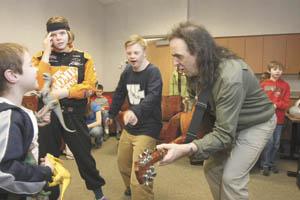Kelly Autism Program
Published 12:00 am Wednesday, April 9, 2008

- Photo by David W. Smith/Daily NewsEthan Burden (from left), 7, Allison Small, 13, Alex Embry, 18, all of Bowling Green, and musician Gary Dulabaum of South Burlington, Vt., sing along April 2 at the Clinical Education Complex at Western Kentucky University.
At about 3 p.m. every day in Western Kentucky University’s Clinical Education Complex’s Kelly Autism Program wing, things get really busy.
“It’s different every day,” said Tara McDonald, 23, a graduate assistant at Western Kentucky University who works with the 88 participants in the program.
Trending
The Kelly Autism Program is a clinical service program designed to support children and young adults who have autism – a disorder characterized by low social interaction skills and different ranges of language delays.
April is National Autism Month. About 1 in 150 school age children have autism, according to the Centers for Disease Control and Prevention. While autism occur in anyone, it is four times more likely to occur in boys than in girls.
What was once an empty space in WKU’s Clinical Education Complex has been transformed to a place 7-year-olds through adults diagnosed with autism feel safe, comfortable and have a sense of security from being with others like themselves.
“Here, they’re like everybody else,” said graduate assistant Sarah McMain, 23, of Owensboro. “They’re not judged here.”
The KAP wing is now filled with a lounge area, a kitchen and classrooms for learning or other activities.
“The kids love it,” said program director Marty Boman.
Trending
The space also has a washer and dryer for older participants to learn to do their own laundry, and a bathroom equipped with a shower for them to learn to bathe and wash their hair, Boman said.
A sink outside the bathroom gives the younger students an opportunity to work on their hygiene skills, like brushing their teeth.
“For autism, it’s behavioral, social interaction, communication and sensory,” Boman said. “It’s either hypo- or hyper-stimulation … it’s hard to understand it, but interesting to see the dynamics.”
The program started in 2002 with about 20 participants.
“Everything is structured,” Boman said.
Before jumping into their daily routine, the participants have a cool-down session, which Boman said a lot of them need.
“They need time to regroup,” she said. “Teaching them to self-regulate are the biggest things we work on.”
At 5 p.m., college students diagnosed with Asperger’s disorder find their way to the center once occupied by the elementary through high school participants.
The college students have social time, academic time, learn life skills and work on future planning. A lot of the college participants, Bowman said, need a quiet space to learn.
Along with learning skills, the older participants – through the program and its partnership with community organizations – are gainfully employed during the summer. Bowling Green Parks and Recreation, Greenview Regional Hospital, Hillvue Heights Church and LifeSkills are just a few employers who have hired KAP participants.
“The community has been very giving and supporting of the program,” Boman said.
Parents who have a child with autism have a 2 percent to 8 percent chance of having a second child who is also affected, according to the CDC.
“Once parents accept the diagnoses, they can move forward. Early intervention is important, and we can make a difference,” Boman said. “The schools, parents and our program are united.”
At the center, Boman said they see a lot of “splinter” intelligence – where there is one area a participant is strong in. For example, she said, there is a 10-year-old who knows a lot about engineering. She said there are both verbal and non-verbal participants, with IQs that range from 50 to 130.
“I’ve been able to work with every age group, and it took a while to get the hang of working with low-functioning participants and then high-functioning participants,” McMain said.
WKU students help teach the participants.
Boman said the program is unique in the state. People drive from Lebanon and Somerset twice a week for their children to be a part of the program, she said. Boman said they are working on a national marketing program to expand program services throughout the state and to universities throughout the nation.
Spotting autism
Here are some signs to look for in the children in your life:
- Lack of or delay in spoken language
- Repetitive use of language and/or motor mannerisms (hand-flapping, twirling objects)
- Little or no
eye contact
- Lack of
interest in peer relationships
- Lack of
spontaneous or make-believe play
- Persistent
fixation on parts of objects
— Autism Society of America
Western’s Kelly Autism Program will commemorate national autism month with an autism festival April 19. For more information on KAP or details on the festival, call 745-4527.






